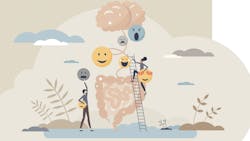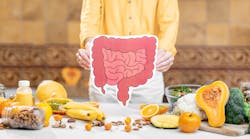“Trust your gut,” and “You are what you eat.” While science discovers new things every day, some expressions or observances from a long time ago are still true today. These two age-old expressions are deeper than one may realize, and they could even help someone struggling with mental illness find the right treatment. Here I’ll highlight the connection between gut bacteria and depressive disorders.
Depression is a mental health disorder that can affect someone no matter their age, ethnicity, or race. An estimated 350 million people struggle with some type of depressive disorder. Depressional disorder, as it is formally called, is when an individual experiences feelings of despair or sadness for more than two weeks. These feelings are so intense they cause someone to no longer act like themselves.
Depressional disorder encompasses many symptoms and causes, so it is divided into several types as seen in Table 1. Depression can be caused by situational and social factors, as well as genetics and neurotransmitters. Doctors and therapists have treated depression with medicines and therapies, with the first step of any treatment being a formal diagnosis. Depressional disorders have become more common during the last few years due to the COVID-19 pandemic, as well as the stigma of mental health slowly diminishing.1-3
What is the gut?
The gut of the body is the entire gastrointestinal (GI) tract, stretching from oral cavity to anus. The mouth, esophagus, stomach, duodenum, small intestine, cecum, appendix, large intestine, ascending and descending transverse colon, rectum, and anus all make up the GI tract. As many as 500 to 1,000 species of funguses, bacteria, viruses, and protozoa live in these areas of the GI tract.
This flora is needed to help the body function. Without all the gut microbiota, the body would not be able to defend itself against pathogens or break down food. As a special byproduct of this breakdown, the GI also extracts and absorbs nutrients, preserves the body’s water supply, and produces beneficial chemicals and hormones.4
While a mental health disorder and a large area of the body may not seem like they’re related, scientific research has shown that they are. This research is cutting-edge because scientists once thought the brain controlled every aspect of the GI tract. Turns out it does not, and the brain can be influenced by the gut because of the gut-brain axis.
The gut-brain axis is the pathway in which the brain and gut talk to each other through direct and indirect communication. Every day, the thousands of microflorae in the GI tract produce neurotransmitters and hormones, the same neurotransmitters and hormones that are found in the brain. Because of the bidirectional gut-brain axis, the brain senses when these neurotransmitters and hormones occur at increasing or decreasing levels, thus influencing one’s mood.
When the microflora in the gut is disrupted, this causes several different types of reactions and causes the body to respond in a way that is negative to health. Interestingly, many different bacteria, seen in Table 2, and the neurotransmitter serotonin have been found in the guts of individuals with a depressive disorder. Additional research is focused on exploring more of the gut-brain axis and how the gut and depression are related.5-8
Interesting relationships
Not only did research prove the bidirectional relationship between the brain and gut, but also the relationship between depressive disorders and dietary choices. Studies show that depressed participants often choose foods that negatively impact their GI and thus cause bad microbes to flourish. Feelings of despair and sadness often lead participants to eat high-fat or high-sugar diets.
Conversely, diets made up of low sugar, low carbohydrates, and high fiber decrease the chances of depressive disorders. Scientists are now wondering if more cases of depressive disorder could be treated by controlling the microflora in the GI tract. Future studies are looking into how promoting probiotics and dietary choices could influence depressive disorders. New research shows that patients who are experiencing a depressive disorder may show signs of constipation and make poor dietary choices because their GI hormones and microbes are at uneven levels.3,9,10
What we can do
Dental professionals can help patients struggling with depressive disorders by discussing the gut-brain axis link and reminding patients that the oral cavity is the beginning of the GI tract. While dental professionals are not licensed to treat depressive disorders, they can suggest controlling bacteria, funguses, and viruses in the mouth with routine, effective oral hygiene habits and dental probiotics.
Remind patients these microbes in the mouth could eventually make their way further into the GI tract, thus increasing in numbers and influencing someone’s depressive disorder. Finally, dental professionals can introduce new research regarding dietary lifestyle choices and depressive disorders.
Editor's note: This article appeared in the November/December 2024 print edition of RDH magazine. Dental hygienists in North America are eligible for a complimentary print subscription. Sign up here.
References
1. Depression. National Institute of Mental Health. 2024. https://www.nimh.nih.gov/health/topics/depression
2. Depression. National Association of Mental Illness. 2024. https://www.nami.org/about-mental-illness/mental-health-conditions/depression/?tab=overview
3. Madison A, Kiecolt-Glaser JK. Stress, depression, diet, and the gut microbiota: human-bacteria interactions at the core of psychoneuroimmunology and nutrition. Curr Opin Behav Sci. 2018;28:105-110. doi:10.1016/j.cobeha.2019.01.011
4. Sloat S. What is the gut? Inverse. 2024. https://www.inverse.com/mind-body/what-is-the-gut
5. Cassano O, Lee M. Does gut health affect depression, and can your diet help? Zoe. 2024. https://zoe.com/learn/gut-health-and-depression
6. Ghannoum M. The promising role of the gut-brain axis in depression treatment. Psychology Today. 2021. https://www.psychologytoday.com/us/blog/the-gut-brain-axis/202105/the-promising-role-the-gut-brain-axis-in-depression-treatment?
7. Gut-brain axis. Psychology Today. 2024. https://www.psychologytoday.com/us/basics/gut-brain-axis
8. Cross PI. Do gut bacteria play a role in depression? Medical News Today. 2022. https://www.medicalnewstoday.com/articles/do-gut-bacteria-play-a-role-in-depression
9. Dilling W. The connection between oral health and gut health. Delta Dental of Wyoming. 2024. https://blog.deltadentalwy.org/connection-between-oral-health-and-gut-health/
10. A moody gut often accompanies depression-a new study helps to explain why. Columbia University Irving Medical Center. 2019. https://www.cuimc.columbia.edu/news/moody-gut-often-accompanies-depression-new-study-helps-explain-why
Types of Depressive Disorders |
|
1. Major Depression |
|
2. Persistent Depressive Disorder |
|
3. Perinatal Depression |
|
4. Seasonal Affective Disorder |
|
5. Bipolar Disorder |
|
6. Depression with Psychosis |
Common Bacteria Associated with Depression |
|
1. Eggerthella |
|
2. Hungatella |
|
3. Sellimonas |
|
4. Lachnoclostridium |
|
5. Coprococcus |
|
6. Lachnospiraceae UCG001 |
|
7. Ruminococcusgauvreauii group |
|
8. Eubacterium ventriosum |
|
9. Subdoligranulum |
|
10. Ruminococcaceae (UCG002, UCG003, UCG005) |
|
11. The family Ruminococcaceae |
About the Author

Tracee S. Dahm, MS, RDH
Tracee S. Dahm, MS, BSDH, is an adjunct clinical instructor for the North Idaho College School of Dental Hygiene. She also works in private practice. Dahm has been published in dental journals, magazines, webinars, and textbooks, and featured on dental podcasts. She is a key opinion leader on cutting-edge innovations in the hygiene field. Her research interests include trends in dental hygiene, improving access to dental care for the underserved, and mental health. She can be reached at [email protected].


